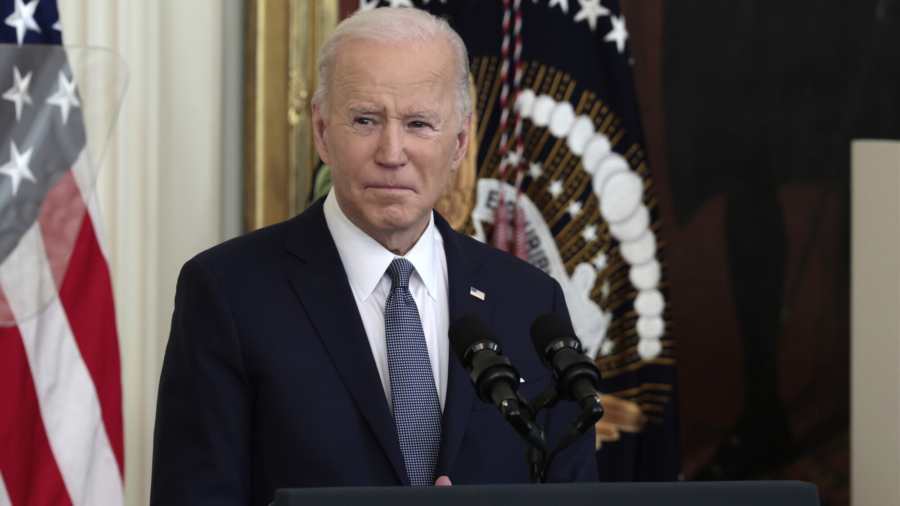President Joe Biden on Tuesday authorized the Department of Energy (DOE) to release 30 million barrels of oil from the U.S. strategic petroleum reserves, representing half of a coordinated 60-million-barrel release from International Energy Agency (IEA) member states.
The move comes as part of an effort to stabilize oil markets amid Russia’s invasion of Ukraine and Western sanctions against Russia. Russia provides 10 percent of the global supply of natural gas and oil and roughly 40 percent of the European Union’s.
The price of crude oil has been accelerating of late and on Tuesday reached more than $104 a barrel—the highest it’s been since 2014.
The announcement to tap oil reserves came out of a meeting Tuesday of the 31 IEA member states that was chaired by U.S. Secretary of Energy Jennifer Granholm.
An IEA release notes that global oil markets were already tight before Russia’s invasion, with heightened price volatility and low commercial inventories.
In a statement, White House press secretary Jen Psaki said, “We are prepared to use every tool available to us to limit disruption to global energy supply as a result of President Putin’s actions. We will also continue our efforts to accelerate diversification of energy supplies away from Russia and to secure the world from Moscow’s weaponization of oil and gas.”
The 60 million barrels represent 4 percent of the 1.5 billion barrels of emergency stockpiles held by IEA members, according to the release, and is equivalent to 2 million barrels a day for 30 days. The United States consumes an average of about 20 million barrels per day.
It’s the fourth time the IEA has tapped its reserves since its creation in 1974.
“It is heartening to see how quickly the global community has united to condemn Russia’s actions and respond decisively,” said IEA Executive Director Fatih Birol in a statement.
One gas and oil expert, Patick De Haan, downplayed the move saying in a tweet that it was “insignificant given the de facto ban on Russian oil.”
Energy giants BP and Shell were among a list of companies to announce an exit from Russia this week in response to its invasion of Ukraine.
And on Tuesday a group of Republican Senators introduced legislation to ban the U.S. purchase of Russian oil.
“First and foremost, President Biden needs to restart America’s energy production and quit financing Vladimir Putin’s war on Ukraine by continuing to purchase crude oil from Russia. Under the previous Administration, our nation was energy independent but President Biden reversed course and turned hostile nations like Russia into America’s gas station,” said the bill’s sponsor Sen. Roger Marshall (R-Kan.) in a statement. “Make no mistake, if President Biden fails to act, we will continue to work in Congress to hold Vladimir Putin accountable.”
Democratic Sen. Joe Manchin (D-W.Va.) has also urged Biden to increase US energy production to deal with the uncertain oil market.
Gas prices in the U.S. continue to rise with the national average at more than $3.61 a gallon. That’s a 23-cent increase from a month ago and an almost 90-cent increase from a year ago, according to AAA.
This is the second time Biden has tapped the U.S. Strategic Petroleum Reserve to attempt to bring down the cost Americans are paying at the pump. Last November, the United States announced a release of 50 million barrels, in concert with oil-consuming nations including China, India, and Japan.
Reuters contributed to this report.
From The Epoch Times


